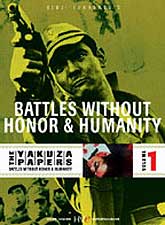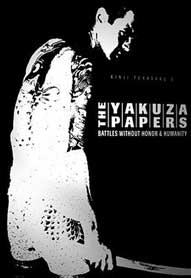 The first in this set of five films marked a decided change in yakuza-eiga or gangster-film in Japan, & the title Battles Without Honor & Humanity says it all. Previously the central hero was always a sad-eyed tragic hero who believed in Duty to his oyabun (godfather) even if the oyabun was a madman. Without adhering faithfully to one's Duty, there could be no honor. But this was weighed against a gambler's own sense of Humanity, which generally meant to not hinder the daily lives of non-yakuza, & to behave chivalrously without seeking recognition. There was no honor in bullying innocent people. The first in this set of five films marked a decided change in yakuza-eiga or gangster-film in Japan, & the title Battles Without Honor & Humanity says it all. Previously the central hero was always a sad-eyed tragic hero who believed in Duty to his oyabun (godfather) even if the oyabun was a madman. Without adhering faithfully to one's Duty, there could be no honor. But this was weighed against a gambler's own sense of Humanity, which generally meant to not hinder the daily lives of non-yakuza, & to behave chivalrously without seeking recognition. There was no honor in bullying innocent people.
The tension between unreconcilable Duty to a crime-boss who commands his men to do injury to the innocent, & one's sense of Humanity, was the source of all the drama in classic yakuza films. The attempt to find some balance of Honor where balance was unachievable could be very intense even before the discord & imbalance caused a great deal of bloodshed. When the hero finally erupts, it is inevitably for the sake of Humanity, requiring a suicidal revenge-raid on the gangster den. Live or die, our chivalrous yakuza is a noble outcast.
But after Francis Copola's The Godfather (1973) reached Japan, yakuza films changed. The Yakuza Papers series defined the change, tripling the violence & portraying the central figure of the tales as a treacherous criminal without much Humanity & with only a hypocritical sense of Duty, more sociopath than the antihero of the classic yakuza-eiga.
Within a year of The Godfather, Kinji Fukasaku was hacking out film upon film about gangsters devoid of honor, capable of treachery & inhumanity. While actors with tragic-heroic visages like Ken Takakura or Koji Tsuruta were cast in films of chivalrous gangsters, a different look was needed for the sociopathic gangster, someone less pretty & more squinty rather than with big gorgeous bedroom eyes like Ken's or Koji's. Bunta Sugawara had just the needed cold killer gaze.
The Yakuza Papers, based very thinly on the life & times of an actual yakuza of the post-war period, was not Fukasaku's only gangster series, but it is representative of the altered genre. The series has now been released with excellent subtitles in a six-volume set of all five films plus a disc of extras. The individual films forming The Yakuza Papers saga are:
Battles Without Honor & Humanity (Jingi naki tataka). 1973
Deadly Fight in Hiroshima (Hiroshima shito hen). 1973
Proxy War (Dairi senso). 1973
Police Tactics (Chojo sakusen). 1974
Final Episode (Kanketsu-hen). 1974
Fukasaku's type of gangster film, & Bunta Sugawara's acting vehicles, were supposed to epitomize a change from Romanticist gangster films of the 1950s to about 1972, to Realistic gangster films from 1972 onward, though Bunta had already been appearing in non-romanticized gangster films even before The Godfather squashed the chivalrous type of gangster film once & for all. Bunta starred in the Gendai Yakuza series of six films between 1968 & 1972, with the last in that series directed by Fukasaku. It would be nice to have boxed sets of sundry other of these types of series.
In reality the movement wasn't from romanticism to realism, but only to a new fantasy of the yakuza, a shift from meaningful violence erupting after other options have disappeared, to unrestrained meaningless mayhem born of anger, greed, stupidity, & lust for power. Yakuza films were suddenly void of the idea of "the exception," the gangster who could at least dream of doing good, whether or not his world made it easy.
That former assumption of a spark of good in a world of criminality was frankly the better way to tell a story, & turning yakuza films into tales of sociopathic behavior was one of the factors that brought about the decline of the Japanese gangster film, & the general collapse of the Japanese film industry during the 1970s & '80s.
The change in the genre was not wholly the fault of The Godfather (which was after all a great movie) but partly a desparate attempt to regain an audience, the classic type of gangser film of the 1960s having begun to fade as a national fad in Japan. The chivalrous films had a gigantic audience of the young & old, men & women; everyone saw them, & Ken Takakura in particular was revered as an incarnation of what it meant to be Japanese. But the new type psycho-gangster epic attracted an audience mainly of young men & never really regained Japan's universal fascination for the gangster world that had for so long been regarded as the final bastion of samurai ethos.
Although the mythic antihero was much more compelling than the treacherous sociopath, Bunta Sugawara's screen presence & suitability for the latter character type was undeniably extraordinary. The Yakuza Papers cycle are period pieces set in the immediate aftermath of the Pacific War, when the Japanese learned they were not an undefeatable divine race, & were told by their God, the Emperior, "I am not God." If there was no god, then everything that issued forth from that assumption, including Humanity & Duty & Honor, were likewise frauds, & all that remained was chaos.
Yakuza films of either group -- the sociopathic, or the chivalric -- can seem slow to the point of tedium to a novice viewer, & even the action can seem dull when the convoluted excessively complicated plot points seem ultimately of no consequence. Much of the tedium extends from the fact that the conventions of the genre were never aimed at western viewers. After viewing a great many such films, shared subtexts with specific cultural meaning become obvious, with tales of sociopaths conveying the loss of Humanity contiguous with the loss of the Emperor as God, & tales of chivalrous gamblers being the last-ditch effort to hold onto some element of tradition & order in a world that has come apart at the seams.
The kitschier ultra-modern yakuza films epitomized by Ichi the Killer (2001) & others by Takashi Miike, are more immediately accessible for their pure exploitation value. But if one has a grounding in the yakuza film types that came before, Miike's & similar directors' borrowings & twists on the classic methods reveal unexpected nuance & texture even in the newest class of yakuza films.
copyright © by Paghat the Ratgirl
|

